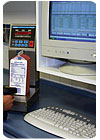
The primary goal of quality assurance (QA) is to ensure safety and quality attributes of products produced and distributed by a processing plant. Typically, this major feat must involve the following concepts for success:
- Development and implementation of sound product standards and processes.
- Establishment of raw material, processing and finished product specifications.
- Generation and monitoring of QA data to ensure compliance to product specifications.
- Reaction to "out-of-spec" data to identify problem areas and implement corrective actions, which requires the ability to handle laboratory data in an organized manner so that outlying data and/or data trends are quickly and easily observed and understood.
A successful QA program ensures that all product safety, quality, and customer expectations are satisfied. The success of the QA program is dependent upon the effective development and implementation of the above concepts. Following these concepts, coupled with HACCP (safety) and International Standards of Organization (ISO 9000 series) programs, can bring QA to 2006 relevancy. In fact, "The basis of the ISO requirements is used for a competent laboratory to organize its analysis in a systematic way, based on the principles of quality assurance, to preclude problems arising" (Standard Methods for the Examination of Dairy Products, 17th Ed. Wehr and Frank - eds., APHA, 2004). These authors detailed common features of a Quality Management System (QMS). In addition, they list "reduce the cost of operations" as one of the goals of QMS. An effective QA program will ensure that products exceed regulatory and company standards as well as customer expectations, while "reducing the cost of operations." Key requirements for a successful QA department are as follows:
- The staff must be knowledgeable, properly trained, and motivated. Technicians must be trained to perform and interpret test results correctly. These individuals need to understand the importance of the tests and acceptable specification data.

- Laboratory equipment/instrumentation must be well maintained, correctly calibrated, and the best suited for the job.
Question:Are you performing the tests correctly and accurately?
- Results must be promptly and accurately documented. The documentation and records need to be easily interpreted and accessible. This requires a format that provides for rapid retrieval of historical data.
Although automation of processes and computerization of various record keeping functions are the way of life in today's dairy operations, many of the QA laboratories are still performing tests, recording the results by hand, and storing them on clipboards or filing them "out of sight." Several laboratory or data management systems are commercially available. One system (QA Studio™) was developed specifically for dairy plant operations. QA Studio decreases or eliminates paperwork and greatly improves efficiency. In addition, it ensures that records are maintained accurately and provides a rapid means of accessing data. Product information and test results can be scanned into the system or easily entered using drop-down lists. A highlighted "out-of-spec" screen and graphing features may be used to summarize results for management. QA Studio is a powerful resource capable of linking the QA program with production management.
Laboratory test results must be used effectively to ensure a successful QA program. Are your results being used effectively or being stored away for historical purposes?
Join Dr. Randolph and Associates in Murfreesboro, Tenn. for an in-depth HTST Workshop, December 4-6, 2006 and in Birmingham, Ala. for a Basic Dairy Technology Workshop, February 4-8, 2007. For registration or additional information on QMS and QA Studio™, please contact Amy Meyer at 205/595-6455 or email ameyer@randolphconsulting.com.
